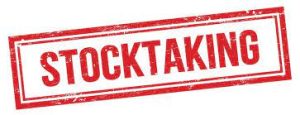The Importance of Stocktaking in your Business
 The Importance of Stocktaking in your Business
The Importance of Stocktaking in your Business
A stocktake is a physical act of checking and counting the quantities of the stock held in an inventory or warehouse. The frequency of stock takes varies from business to business. Much of the time, we have seen many companies never undertake a proper stocktake regularly. Why is this? Many reasons including, a failure to see the importance, they are time-poor, or sometimes it’s just put in the ‘too hard’ basket.
Inventory or stock taking is a process of calculating the amount of stock you have (including food, drink, equipment, etc.) and turning it into a report. Your report tells you the quantity of stock you have, the value of it, and lets you compare it against your previous inventories.S
There are many businesses out there that only do a stock take once a year. Maybe the levels of stock they have don’t change much or they think the job requires too many work hours.
Doing stocktaking however, can speed the process up and help you to increase gross profit, reduce loss, improve control of allowances, reduce waste, and provide instant result
Purpose of Stocktaking
Stocktaking allows you to keep an accurate track of the physical stock you have, what’s been sold, and what hasn’t. It’s all about comparing the physical stock to what the report says then finding any discrepancies. Calculating wastage and allowances will then give you the whole picture as to what’s gone through the till, what’s been wasted, and what has been given away as complimentary.
Stocktaking also allows you to see if there’s a significant discrepancy between what you think you should have and what you actually have. Your stock take can highlight a number of problems including theft and shrinkage issues.
That’s not nearly all though, there are 9 critical reasons why you should carry out a regular stock take.
A robust stocktaking method allows you to:
- Measure how well a product is performing against others.
- Become efficient at ordering and forecasting stock levels.
- Keep up to date with your current purchase prices and lets you see when they are creeping up.
- Uncover and eliminate theft within the business.
- Calculate how much your stock costs to buy, what price to sell it at, and how much stock you have on your site.
- Ascertain accurate gross profit margins for your products.
- Maintain gross profit levels or find out why you are not hitting your targets.
- Know what stock you have in your building and when it’s due to go out of date.
- Discover dead stock: seeing how long you’ve had particular products for helps you to determine which items sell.
Types of Stocktaking
- Periodic stocktaking – an inventory method that happens at the end of an accounting period or on a set periodic basis. This method will help you effortlessly keep up-to-date records of either your inventory or costs of goods sold.
- Spot checks are scheduled (and sometimes random) manual checks on stock or cash in tills. They can allow you to make sure there are no discrepancies between what your software thinks you should have and what is actually there. These are also good to do if you think theft is occurring.
- Continuous, perpetual stocktaking is done throughout the year at a few different points.
- Stock out validation happens when stock levels have become dangerously low.
- Annual stocktaking is done in the last month of the financial year. In some circumstances, it may require premises to close for a few days.
Advantages of Stocktaking
The importance of stocktaking is clear. It allows you to regularly monitor and increase gross profit, reduce loss, improve control of allowances, and reduce waste.
Traditionally, stock reporting was carried out on one day, the numbers crunched over the next couple of days, and then you got your results after a few days (or sometimes a week). With a decent stock taking method, you get same-day reports, you can even get live, real time reports.
Without further ado, here are 7 advantages which explain the Importance of Stocking:
1. Increases Profit whilst Reducing loss and waste
Yes, you really can increase profit margin by getting a realistic view of what you have, what is selling and if things are going wrong to capture them at the earliest opportunity.
Stocktake is the physical counting of all stock and matching it against the stock numbers you have recorded in your books/software.
2. Providing Accurate Stock Records of which products are performing well and which are not
The accuracy and regular process of stock-take will help with making an informed, data-backed decision to invest in the right products, as it will show you which products are selling and which are not and therefore what to invest in.
You will also be able to see if there is a dead stock that you should think about possible flash sales to shift the stock. Although it will obviously mean that you will be selling at a lower profit margin, it is much better to settle for that than letting the stock sit there taking up valuable warehouse/storage space and reduce inventory.
During my days as SCM manager, I used to put all dead and slow-moving inventory in one area of the warehouse to show how much value space dead or slow-moving inventory is occupying. One of the key purpose of stocktaking is to physically go and see the dust of the dead and slow-moving inventory, again emphasising better inventory reduction strategies.
3. Getting your Assets Right on the balance sheet.
Inventory is the balance sheet entry as an asset, hence, very important for our accounting and finance friends. This number has to be as accurate as possible, which alone emphasise the importance of stocktaking.
4. Monitor Real-Time Stock Levels – Identify Shrinkages, Damage, and Theft
The data of the Stocktake will clearly be the most up-to-date check and cross-reference data of what you have to what you should have and what you actually have.
Unfortunately, theft and damage can occur– the stocktake will uncover these as discrepancies and allow you to be proactive.
Theft
A regular stocktake can be a positive deterrent to staff theft as the knowledge of these regular checks.
If the investigation into discrepancies shows there’s a shoplifting issue that is not a ‘one-off’ occurrence, a review of current store security will be necessary. You may
Stock Damage
In terms of stock damage, the stocktake will highlight where and why stock damage is taking place.
If a stocktake did not take place, you will naturally assume all your stock is in saleable condition, so when you go to retrieve an item for sale or have a customer request it, you discover at the last moment that you cannot sell it and have to turn the customer away.
- Identify and put into place preventative steps for future preservation of stock
- Order replacement stock in good time to prevent loss of custom
This advantage alone is enough to fulfill the purpose of stocktaking for any small or large organisation.
5. Monitor Seasonal Stock and stock with Expiry Dates in a timely manner
Time is essential when it comes to seasonal and stock with expiry dates, simply because they are time restricted.
6. Review Pricing Strategies keep Up to Date with your current Purchase Prices
7. Catch up on 5S of the Factory and Warehouse
If you’re not using a stock management system or unhappy with your current system, get in contact with our team. We’d be happy to help you reach your stock management goals, kindly contact us at :
E-mail: care@sowprofessional.com
Website: www.sowprofessional.com
Phone: 07038254989
Whatsapp: 07038254989



